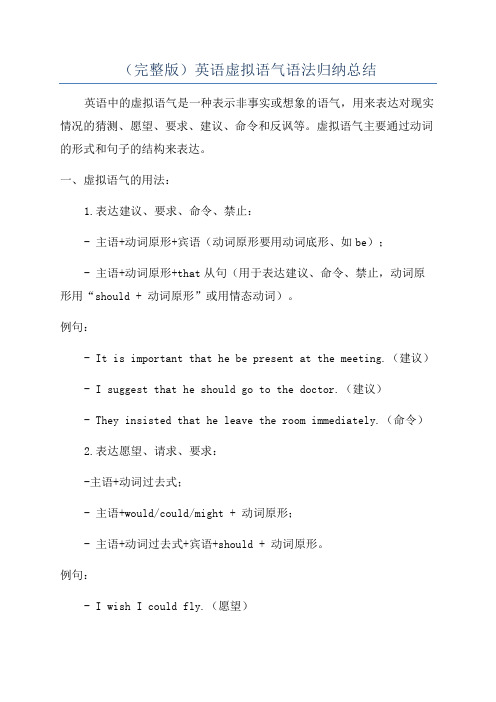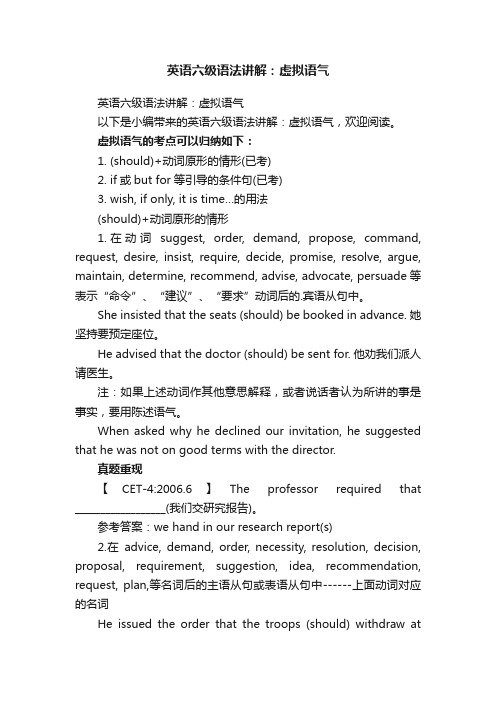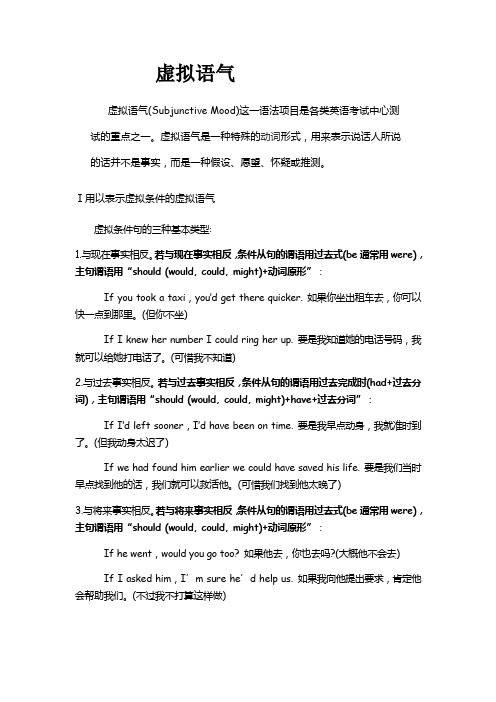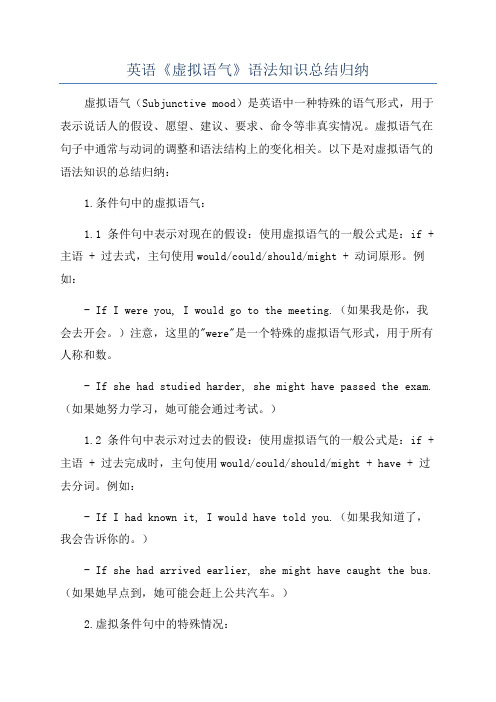大学英语六级常考语法精讲虚拟语气
(完整版)英语虚拟语气语法归纳总结

(完整版)英语虚拟语气语法归纳总结英语中的虚拟语气是一种表示非事实或想象的语气,用来表达对现实情况的猜测、愿望、要求、建议、命令和反讽等。
虚拟语气主要通过动词的形式和句子的结构来表达。
一、虚拟语气的用法:1.表达建议、要求、命令、禁止:- 主语+动词原形+宾语(动词原形要用动词底形、如be);- 主语+动词原形+that从句(用于表达建议、命令、禁止,动词原形用“should + 动词原形”或用情态动词)。
例句:- It is important that he be present at the meeting.(建议)- I suggest that he should go to the doctor.(建议)- They insisted that he leave the room immediately.(命令)2.表达愿望、请求、要求:-主语+动词过去式;- 主语+would/could/might + 动词原形;- 主语+动词过去式+宾语+should + 动词原形。
例句:- I wish I could fly.(愿望)- I would appreciate it if you could help me.(请求)3.表示虚拟条件:- If条件从句中的谓语动词用过去完成时,主句用would/should/might/could + have + 过去分词;- If条件从句中的谓语动词用过去时,主句用would/should/could + 动词原形。
例句:- If I had known his phone number, I would have called him.(虚拟条件)- If you had listened to me, we could have finished the project earlier.(虚拟条件)4.表达建议、要求、祝愿:- If only内部称述 + 主语 + 过去式。
英语六级语法讲解:虚拟语气

英语六级语法讲解:虚拟语气英语六级语法讲解:虚拟语气以下是小编带来的英语六级语法讲解:虚拟语气,欢迎阅读。
虚拟语气的考点可以归纳如下:1. (should)+动词原形的情形(已考)2. if或but for等引导的条件句(已考)3. wish, if only, it is time…的用法(should)+动词原形的情形1.在动词suggest, order, demand, propose, command, request, desire, insist, require, decide, promise, resolve, argue, maintain, determine, recommend, advise, advocate, persuade等表示“命令”、“建议”、“要求”动词后的.宾语从句中。
She insisted that the seats (should) be booked in advance. 她坚持要预定座位。
He advised that the doctor (should) be sent for. 他劝我们派人请医生。
注:如果上述动词作其他意思解释,或者说话者认为所讲的事是事实,要用陈述语气。
When asked why he declined our invitation, he suggested that he was not on good terms with the director.真题重现【CET-4:2006.6】The professor required that __________________(我们交研究报告)。
参考答案:we hand in our research report(s)2.在advice, demand, order, necessity, resolution, decision, proposal, requirement, suggestion, idea, recommendation, request, plan,等名词后的主语从句或表语从句中------上面动词对应的名词He issued the order that the troops (should) withdraw atonce. 他命令部队马上撤退。
虚拟语气英语知识点总结

虚拟语气英语知识点总结一、虚拟语气的概念。
虚拟语气是一种特殊的动词形式,用来表示说话人所说的话不是一个事实,而是一种假设、愿望、怀疑、猜测或建议等。
二、虚拟语气在条件句中的用法。
1. 与现在事实相反的虚拟条件句。
- 结构:从句(If + 主语+ 动词的过去式(be动词一般用were)),主句(主语+ would/should/could/might+动词原形)。
- 例如:If I were you, I would study harder.(如果我是你,我会更努力学习。
实际上我不是你)2. 与过去事实相反的虚拟条件句。
- 结构:从句(If+主语+had+过去分词),主句(主语+would/should/could/might + have+过去分词)。
- 例如:If he had taken my advice, he would have passed the exam.(如果他听了我的建议,他就会通过考试了。
实际上他没听建议,也没通过考试)3. 与将来事实相反的虚拟条件句。
- 结构:从句(If+主语+动词的过去式/should+动词原形/were to+动词原形),主句(主语+would/should/could/might+动词原形)。
- 例如:If it rained tomorrow, we would stay at home.(如果明天下雨,我们就会待在家里。
明天是否下雨还不确定,但这是一种假设情况)- 或者If he should come tomorrow, I would tell him the news.(如果他明天来,我就会告诉他这个消息)- 以及If I were to see her tomorrow, I would give her the book.(如果我明天见到她,我就会把书给她)三、虚拟语气在宾语从句中的用法。
1. wish后的宾语从句。
- 表示与现在事实相反的愿望,从句谓语动词用过去式(be动词用were)。
大学英语六级之虚拟语气讲解

大学英语六级之虚拟语气讲解2016年大学英语六级之虚拟语气讲解虚拟语气表示说话者所说的话并非事实,或难以实现的,甚至表达相反的概念。
另外表示主观愿望或表达某种强烈的感情时,也用虚拟语气。
本文便是为大家讲解虚拟语气的语法。
欢迎阅读!语气的定义和种类1 语气(mood)语气是动词的一种形式,表示说话人对某一行为或事情的看法和态度。
2 语气的种类⑴ 陈述语气:表示动作或状态是现实的、确定的或符合事实的,用于陈述句、疑问句和某些感叹句。
如:①There are two sides to every question.每个问题都有两个方面。
②Were you busy all day yesterday?昨天一整天你都很忙吗?③How good a teacher she is!她是多好的一位老师啊!⑵祈使语气:表示说话人对对方的请求或命令。
如:①Never be late again!再也不要迟到了。
②Don’t forget to turn off the light.别忘了关灯。
⑶虚拟语气:表示动作或状态不是客观存在的事实,而是说话人的主观愿望、假设或推测等。
如:①If I were a bird, I could fly in the air.如果我是一只小鸟,我就能在空中飞行。
②I wish I could pass the examination.我希望我能通过考试。
③May you succeed!祝您成功!简单句中的虚拟语气一、情态动词的过去式用于现在时态时,表示说话人的谦虚、客气、有礼貌、或委婉的语气,常用于日常会话中。
如:⑴.Would you be kind enough to show me the way to thepost office?请你告诉我去邮局的路好吗?⑵.It would be better for you not to stay up too late.你最好别熬夜到很晚。
六级语法 虚拟语气(3)

六级语法三、虚拟语气掌握虚拟语气中主句和从句的各种时态对应问题,学会在何种从句中何时用虚拟语气。
一、中文译成英文1. I don t think it advisable that parents (剥夺孩子们的自由) to spend their spare time as they wish.(08.12)2. But for mobile phones, (我们的通信就不可能如此迅速和方便).(07.12)3. It is absolutely unfair that these children (被剥夺了受教育的权利). (07.06)4. If you had (听从了我的忠告,你就不会陷入麻烦). (06.12)5. I think it s high time you (意识到酒后驾驶的危险性). (05.01)6. Most educators advise that kids(不要沉溺于电脑游戏)(10.06)Key 1. (should) deprive their children of freedom2. our communication would not be so efficient and convenient3. (should) be deprived of their rights to receive education4. followed my advice/suggestion, you wouldn t have been/put yourself in trouble5. realized the danger of drunk driving6. (should) not indulge (themselves) in computer games二、听力对话理解1.(04.06)[A]The man is not suitable for the position.[B]The job has been given to someone else.[C]She had received only one application letter.[D]The application arrived a week earlier than expected.M:I wonder if you find my experience relevant to the job.W:Yes, certainly. But if only you had sent in your application letter a week earlier!Q:What does the woman imply?2.(03.12)[A]The woman had been planning for the conference.[B]The woman called the man but the line was busy.[C]The woman didn t come back until midnight.[D]The woman had guests all evening.M:I thought you were going to call me last night about the plans for the conference on language teaching.W:Sorry, I should have, but Tom and Jane stopped by and stayed until midnight.Q:What do we learn from the conversation?3.(10.06)[A]Leave Daisy alone for the time being.[B]Go see Daisy immediately.[C]Apologize to Daisy again by phone.[D]Buy Daisy a new notebook.M: Daisy was furious yesterday because I lost her notebook. Should I go see her and apologize to her again?W: Well, if I were you, I d let her cool off a few days before I approach her.Q: What does the woman suggest the man do?4.(03.06)[A]She suggested a way out of the difficulty for the man.[B]She took the man to where he wanted to go.[C]She came a long way to meet the man.[D]She promised to help the man.M:Thank you for your helpful assistance. Otherwise, I d surely have missed it. The place is so out of the way.W:It was a pleasure meeting you. Good bye!Q:Why did the man thank the woman?Key 1. 【分析】选[B]。
英语虚拟语气讲解

虚拟语气虚拟语气(Subjunctive Mood)这一语法项目是各类英语考试中心测试的重点之一。
虚拟语气是一种特殊的动词形式,用来表示说话人所说的话并不是事实,而是一种假设、愿望、怀疑或推测。
Ⅰ用以表示虚拟条件的虚拟语气虚拟条件句的三种基本类型:1.与现在事实相反。
若与现在事实相反,条件从句的谓语用过去式(be通常用were),主句谓语用“should (would, could, might)+动词原形”:If you took a taxi,you’d get there quicker.如果你坐出租车去,你可以快一点到那里。
(但你不坐)If I knew her number I could ring her up. 要是我知道她的电话号码,我就可以给她打电话了。
(可惜我不知道)2.与过去事实相反。
若与过去事实相反,条件从句的谓语用过去完成时(had+过去分词),主句谓语用“should (would, could, might)+have+过去分词”:If I’d left sooner,I’d have been on time.要是我早点动身,我就准时到了。
(但我动身太迟了)If we had found him earlier we could have saved his life. 要是我们当时早点找到他的话,我们就可以救活他。
(可惜我们找到他太晚了)3.与将来事实相反。
若与将来事实相反,条件从句的谓语用过去式(be通常用were),主句谓语用“should (would, could, might)+动词原形”:If he went,would you go too? 如果他去,你也去吗?(大概他不会去)If I asked him,I’m sure he’d help us. 如果我向他提出要求,肯定他会帮助我们。
(不过我不打算这样做)大多数的虚拟条件句属于上面三种情况的一种,但并不排除存在条件和后果中,一个和现在情况相反,另一个和过去情况相反,例如:If you had followed what the doctor said, you would not have been so painful now.这个句子在高中出现频率颇高。
英语《虚拟语气》语法知识总结归纳

英语《虚拟语气》语法知识总结归纳虚拟语气(Subjunctive mood)是英语中一种特殊的语气形式,用于表示说话人的假设、愿望、建议、要求、命令等非真实情况。
虚拟语气在句子中通常与动词的调整和语法结构上的变化相关。
以下是对虚拟语气的语法知识的总结归纳:1.条件句中的虚拟语气:1.1 条件句中表示对现在的假设:使用虚拟语气的一般公式是:if + 主语 + 过去式,主句使用would/could/should/might + 动词原形。
例如:- If I were you, I would go to the meeting.(如果我是你,我会去开会。
)注意,这里的"were"是一个特殊的虚拟语气形式,用于所有人称和数。
- If she had studied harder, she might have passed the exam.(如果她努力学习,她可能会通过考试。
)1.2 条件句中表示对过去的假设:使用虚拟语气的一般公式是:if + 主语 + 过去完成时,主句使用would/could/should/might + have + 过去分词。
例如:- If I had known it, I would have told you.(如果我知道了,我会告诉你的。
)- If she had arrived earlier, she might have caught the bus.(如果她早点到,她可能会赶上公共汽车。
)2.虚拟条件句中的特殊情况:2.1 在虚拟条件句中表示命令、建议时,主句中的动词可以使用动词原形(而不是would/could/should/might + 动词原形)。
例如:- If you have any questions, please let me know.(如果你有任何问题,请告诉我。
)- If I were you, I would take a break.(如果我是你,我会休息一下。
2019英语六级语法复习:虚拟语气

2019英语六级语法复习:虚拟语气2019英语六级语法复习:虚拟语气1.主从句谓语动词的时态(1)掌握主从句谓语动词的规范搭配:如:If the doctor had been available, the child could not have died.There is a real possibility that these animals could be frightened, should there be a sudden loud noise.(2)区分主从句表示的不同时间概念:主从句谓语动词所指时间不同,这叫做错综时间条件句,动词形式应根据实际情况来调整。
如:Had it not been for the timely investment from the general public, our company would not be so thriving as it is.(主句与现在事实相反,从句与过去事实相反)Had Paul received six more votes in the last election, he would be our chairman now.(主句与现在事实相反,从句与过去事实相反)(3)识别事实和假设混合句:Your math instructor would have been happy to give you a make-up examination had you gone and explained that your parents were ill at the time. (句子前半部分为假设情况,而“父母病了”是事实) I would have gone to visit him in the hospital had it been at all possible, but I was fullyoccupied the whole of last week. (前半部分为假设,后半部分是事实)2.名词性从句的虚拟形式名词性从句是指宾语从句、主语从句、表语从句和同位语从句。
- 1、下载文档前请自行甄别文档内容的完整性,平台不提供额外的编辑、内容补充、找答案等附加服务。
- 2、"仅部分预览"的文档,不可在线预览部分如存在完整性等问题,可反馈申请退款(可完整预览的文档不适用该条件!)。
- 3、如文档侵犯您的权益,请联系客服反馈,我们会尽快为您处理(人工客服工作时间:9:00-18:30)。
大学英语六级常考语法精讲虚拟语气
高校英语六级常考语法精讲:虚拟语气
六级常考语法之虚拟语气
1. 表示现在/过去/将来状况的虚拟条件句
虚拟条件句主要有三种结构:
1) 表示与现在状况相反:主句谓语用would / could / might +动词原形,从句谓语用动词的一般过去时(动词be的过去式一律用were)。
If I were you, I would not accept his offer.
If I had time, I would certainly go to the cinema with you.
2) 表示与过去状况相反:主句谓语用would / could / might + have +过去分词,从句谓语用过去完成时。
If I had got up a little earlier, I wouldnt have missed the train.
If I had been more careful, I might have passed that exam.
3) 表示与将来状况相反:主句谓语用would / could / might +动词原形,从句谓语用were +动词不定式或should +动词原形。
If I were to do the job, I would not be able to have enough time to study.
If it should rain tomorrow, I would not go out with you.
2. 虚拟条件句连接词if的省略
假如虚拟条件句的从句中含有were, had, should, could 等词时,可以省略连接词if,但这时必需把were, had, should, could等词移到主语前面,形成倒装。
这种句型主要用于书面形式。
Were I to do the job, I would finish doing it within two weeks.
Had it not been for his help, we couldnt have arrived there on time.
Should it rain tomorrow, I would stay at home.
3. wish后宾语从句中的谓语构成
动词wish后的宾语从句表示未实现的或不行能实现的愿望,其宾语从句中的谓语动词要用虚拟语气,有以下三种构成形式。
1) 表示现在不行能实现的愿望,宾语从句中的谓语动词用一般过去时。
(be的过去式为were)。
I wish I had enough money to buy a car.
I wish I were as young and energetic as you.
2) 表示过去未能实现的愿望,宾语从句中的谓语动词用过去完成时(had +过去分词)或would / could + have +过去分词。
I wish I hadnt made such a mistake.
I wish I could have done it better.
3) 表示将来不行能实现的愿望,宾语从句中的谓语动词用would / should +动词原形。
I wish I would not get old.
I wish I could travel around the world one day.
4. 某些动词后的宾语从句中谓语动词要用虚拟语气
在一些动词后面的宾语从句中,谓语动词要用虚拟语气。
这时,谓语动词用动词原形或should +动词原形。
这类动词一般表示命令,要求,打算,建议,主见等概念,主要有:advise, ask, command, decide, demand, desire, direct, insist, move, order, propose, recommend, request, require, suggest,等。
高校英语六级常考语法精讲:虚拟语气
六级常考语法之虚拟语气
1. 表示现在/过去/将来状况的虚拟条件句
虚拟条件句主要有三种结构:
1) 表示与现在状况相反:主句谓语用would / could / might +动词原形,从句谓语用动词的一般过去时(动词be的过去式一律用were)。
If I were you, I would not accept his offer.
If I had time, I would certainly go to the cinema with you.
2) 表示与过去状况相反:主句谓语用would / could / might + have +过去分词,从句谓语用过去完成时。
If I had got up a little earlier, I wouldnt have missed the train.
If I had been more careful, I might have passed that exam.
3) 表示与将来状况相反:主句谓语用would / could / might +动词原形,从句谓语用were +动词不定式或should +动词原形。
If I were to do the job, I would not be able to have enough time to study.
If it should rain tomorrow, I would not go out with you.
2. 虚拟条件句连接词if的省略
假如虚拟条件句的从句中含有were, had, should, could 等词时,可以省略连接词if,但这时必需把were, had, should, could等词移到主语前面,形成倒装。
这种句型主要用于书面形式。
The workers demanded that their wages be raised by 10 per cent.
The teacher decided that you do the experiment first.
5. 某些名词后的表语从句和同位语从句中谓语动词要用虚拟语气
在一些名词后面的表语从句和同位语从句中,谓语动词要用虚拟语气。
这时,谓语动词用动词原形或should +动词原形。
这类名词一般表示命令,要求,打算,建议,主见等概念,主要有:advice, idea, instruction, motion, order, plan, proposal, recommendation, request, requirement, suggestion,等。
My suggestion is that we send for a doctor immediately.
He gave the order that they do the experiment again.
6. 错综时间条件句
条件从句表示的动作和主句表示的动作,有时发生的时间是不全都的.如从句是对过去状况的假设,而主句可能是对现在正在进行状况的假设。
这种句子称为错综时间条件句.
If the weather had been more favourable, the crops would be growing still better.
7. 某些主语从句中的谓语动词要用虚拟语气
某些表示命令,要求,打算,建议,主见以及重要性和紧迫性等概念的主语从句中谓语动词要用虚拟语气。
这时,谓语动词用动词原形或should +动词原形。
这类主语从句一般由It is + 形容词/过去分词+ that引导的从句构成。
该结构中,常用的形容词主要有:advisable, appropriate, desirable, essential, imperative, important, necessary, obligatory, proper, urgent, vital等;常用的过去分词主要有:arranged, decided, demanded, desired, ordered, proposed, recommended, requested,
suggested等。
